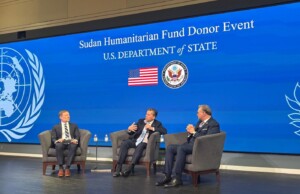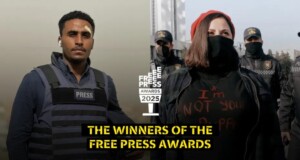Displaced in Sudan don’t feel represented by Sudanese media
Representatives of the displaced in Sudan feel that many Sudanese media do not pay enough or the right attention to their problems and issues. They do make an exception for Radio Dabanga…
 The crowd welcoming Radio Dabanga editor-in-chief Kamal El Sadig in his hometown Um Kedada in february (RD)
The crowd welcoming Radio Dabanga editor-in-chief Kamal El Sadig in his hometown Um Kedada in february (RD)
Representatives of the displaced in Sudan feel that many Sudanese media do not pay enough or the right attention to their problems and issues. They do make an exception for Radio Dabanga…
Representatives of the Displaced People and Refugees Bloc of the Sudan Call (an alliance of opposition parties, rebel groups, and civil society organisations formed in 2014) said in a meeting with the Minister of Culture and Information Feisal Mohamed Saleh yesterday that the news in Sudan is often misleading.
The Sudanese media are not concerned with the facts of what is happening on the ground in Darfur and other war-torn regions in Sudan, the displaced told the minister. They have not paid attention to the problems of the displaced in the camps for the past 15 years, they say.
“Radio Dabanga remains the only media outlet that continues to transmit our news and our issues of importance with transparency and clarity,” they said. “For 15 years, the Sudanese media have been completely absent in Darfur, and when they published news about the region, it was misleading and not based on facts.”
Osman Hussein, representative of the Displaced People and Refugees Bloc, said at a press conference after the meeting that the talks with the minister concentrated on “the importance of the media in this difficult stage of democratic transition”.
Minister Saleh stressed the need to acknowledge the cultural diversity in Sudan. The media should make room for that, he said. “The cultures of the people in the whole of Sudan, their dialects and local languages must have a place in the media. The faces on the TV screen must be diversified.”
He added that the media play a major role in the peace process by the way they cover the dialogue.
His Ministry has established a Department for Peace and Cultural Diversity whose mission is to raise issues from various areas of Sudan, and bring programmes on peace and the opinion of the people.
In February 2020 Radio Dabanga editor-in-chief Kamal El Sadig visited Khartoum and Darfur. A report about this visit can be found here.
Radio Dabanga’s editorial independence means that we can continue to provide factual updates about political developments to Sudanese and international actors, educate people about how to avoid outbreaks of infectious diseases, and provide a window to the world for those in all corners of Sudan. Support Radio Dabanga for as little as €2.50, the equivalent of a cup of coffee.












 and then
and then